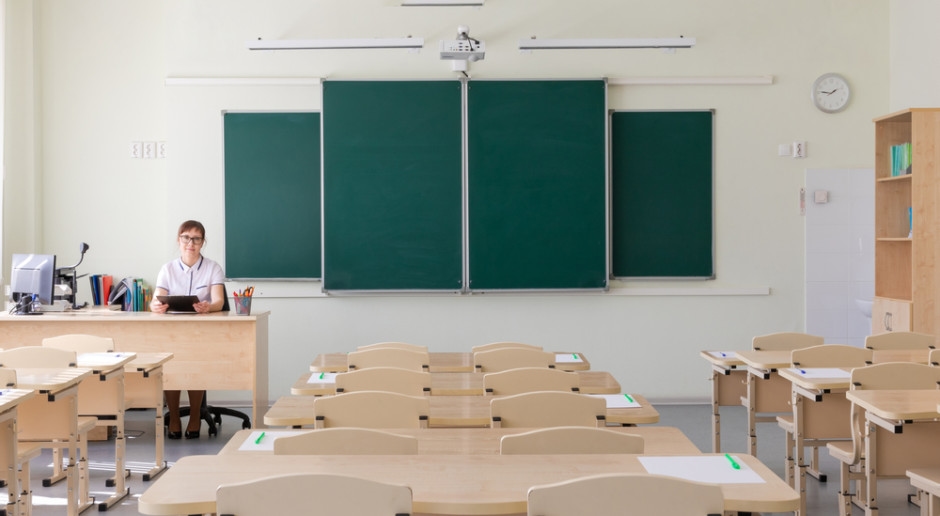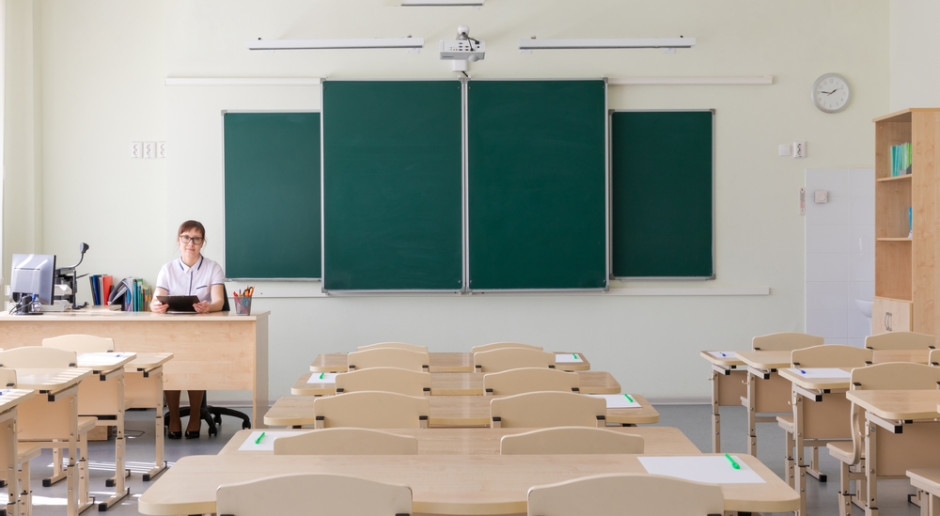Health education may share the same fate as HiT. Another dead subject in schools.

- "What's happening around this subject is contributing to a deepening crisis of trust in the school." The way the new subject is being implemented raises concerns.
- The introduction of health education was premature. There was a lack of trained staff and effective communication with the public, say school representatives.
- Health education is part of a major reform planned for 2026. It should be introduced gradually. It should be made a compulsory subject, they add.
- As a teacher, I am sorry that what is happening around health education is contributing to a deepening lack of trust in schools - says Katarzyna Przybysz, author of the first health education curriculum for primary schools in the country and a biology and chemistry teacher at the Primary School in Dzierzgoń in the Pomeranian Voivodeship.
He believes that heated arguments are now replacing substantive discussion . "Teachers' competences have been questioned for years, so it was easy to draw attention to issues that are actually marginal, but in public debate have become fundamental," he adds.
Eugeniusz Bugaj, principal of Primary School No. 3 in Myszków, shares similar observations.
"Schools today face constant criticism. Did it ever occur to parents to criticize, to tell them what to teach and how to teach it? We relied on a certain trust and respect for the knowledge imparted at school. Now everyone considers themselves an expert in many fields, and teachers' competences are constantly questioned ," he says.
"The introduction of the subject was dominated by haste, and there was a lack of social dialogue"Our interviewees unanimously emphasize that the way the subject was introduced in schools raises many concerns and could have become a pretext for criticism. What could have contributed to such a negative reception?
Katarzyna Przybysz, although she claims to be an enthusiast of health education in schools, sees many flaws in the way it is implemented.
"It's a good subject, but its introduction should be preceded by several years of testing. And what are the realities? Two online conferences, no database of materials for teachers. The ministry should be taking care of this, claiming it has prepared a core curriculum and that's enough. Instead of solid knowledge of the subject, ideological debate has taken center stage," he says.
Her opinion is shared by the principal of the Myszków primary school, Eugeniusz Bugaj:
This subject was introduced too quickly. A year, perhaps two, should have been allowed for staff preparation. This current state of affairs is a manifestation of politicization that could have been avoided by preparing the reform slowly, giving schools time to implement it in a calm atmosphere.
- When it comes to health education, I was optimistic at the beginning - says Father Jarosław Magierski, a long-time teacher of family life education and philosophy at a technical school.
However, he has reservations about the way the reform was implemented. "Today I see that this subject and this formula have no chance of success. Education is a long-term design process," he emphasizes.
Meanwhile, he claims, the introduction of the subject was dominated by haste and there was a lack of social dialogue.
"The subject might have merit if a broader group of interested parties had been invited to the discussion and a consensus had been reached. It's a shame, because first aid, healthy eating, psychoeducation, cybersecurity, knowledge about procreation, and identifying places where help can be found are all incredibly useful," he concludes.
"The subject incorporates elements of safety education, discusses hygiene, touches on psychological issues, highlights the needs of people with disabilities, and helps understand social issues. Compared to family life education, health education is much more diverse and assumes an interdisciplinary approach to knowledge acquisition," confirms Katarzyna Przybysz.
Difficult, perhaps even controversial, topics are also discussed during parenting time, yet no one takes a child out of parenting time. We're dealing with a mechanism that fosters distrust of the subject.
- says Katarzyna Przybysz
Health education must therefore be presented in a broader context, as part of a larger reformAgreeing with the concept of health education and appreciating its educational value, Eugeniusz Bugaj points to a communication problem which, in his opinion, contributed to the low interest in the classes on a national scale.
"The lack of public outreach, especially among parents, has resulted in little interest in these lessons nationwide. There was also a lack of substantive communication to the public. The assumptions and goals were not explained in detail, which has led to it being easy to rely on public ignorance and fear ," says the principal of Primary School No. 3 in Myszków.
Katarzyna Przybysz also emphasizes the role of reliable information, which was missing when implementing health education.
"At my school, most students attend health education. I don't teach every grade, but it's a different situation because parents know me as a teacher, they know how I work, the methods I use, they know about my publications, and they trust me. In early September, they received the lesson topics presented in accessible, understandable language, and they were informed about what the classes would cover. Transparency and a convincing format are essential in communication with both parents and students," she emphasizes.
Content related to puberty was added, but it was done in such a way that the baby was thrown out with the bathwater. The entire discussion was reduced to ideology. The polemics are intensifying.
- notes Jarosław Magierski.
According to experts, the requirements outlined in the core curriculum need to be analyzed for correlation with other subjects. Therefore, health education must be presented in a broader context, as part of a larger reform.
"According to the plans, after 2026, biology and geography will disappear as separate subjects from grades 5-6. They will be replaced by natural science," says Katarzyna Przybysz.
He points out that the children who have just entered fourth grade will be the last to learn biology and geography under the current rules. "In this context, we should view health education as a complement to the content that the new science will cover," he emphasizes.
There is a lack of specialist teachers and teaching materials- Ideally, health education would be taught by various specialists, e.g. representatives of medical services who teach hygiene-related issues, but the realities of schools are completely different - says Eugeniusz Bugaj.
The subject will therefore be taught by a single teacher, who specializes in one subject . Meanwhile, as the principal emphasizes, there are sometimes a shortage of staff to teach the subject. "In my case, it will be taught by a biologist and a psychologist," he points out.
"Initially, the ministry assumed that health education would be taught by specialists in various fields. This is a very good idea, but it cannot be implemented in Polish schools . A psychologist who would attend classes in various classes would have to deal with only that, and in their own schedule, they have completely different responsibilities," adds Katarzyna Przybysz. "So, it is taught by biology teachers, family life teachers, or physical education teachers. With such a broad range of topics, it's difficult to obtain specialist knowledge in every field," she says.
Teaching materials would be helpful for teachers, but even here, support from the ministry is lacking. Teachers are left to fend for themselves.
- There are too few available materials that we could use - emphasizes Eugeniusz Bugaj.
"Until July, there were no materials," says Katarzyna Przybysz. "So I registered as a publisher myself and published my own curriculum. I created a guide myself, which now has hundreds of downloads and helps many teachers," she adds.
According to the teacher, it is important that the materials are both diverse and practical.
"My guide breaks the stereotype that a curriculum consists of dozens of pages of specialized text. In my case, it's one page where I've written down the course objectives, and the rest are step-by-step lessons, following the "1 page - 1 lesson" principle. I create worksheets, role-plays, and include links to valuable resources for the lessons. I'm also committed to modern technology and know how important it is to incorporate these skills into the educational database," says the teacher.
He suggests it's worth taking advantage of a wide range of expert resources. "I use support from non-governmental organizations, including the Empowering Children Foundation and Hate Stop," he lists.
Jarosław Magierski points out that the subject covers a wide range of topics and therefore requires thorough preparation in the form of postgraduate studies .
- It takes time, and even if someone completes two semesters of postgraduate studies, will they actually be prepared to teach classes in so many different fields? - wonders Jarosław Magierski.
The older the students, the less interest they have.At Primary School No. 3 in Myszków, the vast majority of children will be enrolled in health education. There are no opt-outs in grades 4-6. However, the three 7th grade classes will be divided into two combined classes.
- In eighth grades, we have 100% cancellations because, according to the ministry's suggestion, these optional classes are to be held during the last hour of the school day - says the school's director, Eugeniusz Bugaj.
When asked how the students' withdrawal will affect the class schedule, he replied that it won't. But another problem arises.
"According to the Teachers' Charter, an employee assumes specific duties at the beginning of the school year. If students withdraw, the number of scheduled hours is reduced, and staffing changes are not permitted during the school year," he explains.
"We expected older students to drop out. They'd rather spend their time studying for exams. At our school, eighth-graders dropped out en masse. They're preparing for exams and have a lot of extracurricular activities. Should they stay at school for the eighth period?" comments Katarzyna Przybysz.
Jarosław Magierski points out that in high school—for example, in a technical school—in addition to general education subjects, there are a lot of vocational subjects. "I don't know if adding another hour makes sense."
The lack of a manual isn't the problem. The problem is how changes are implemented.When asked about the need for a health education textbook, Director Bugaj responds with a question: "Are there any life textbooks? Do we have a parenting school that teaches parents how to be parents?"
He believes that the specificity of the subject requires a substantive teaching framework based on scientific knowledge, but that the most depends on the teacher.
The point is to break the mold and keep students interested. It's good that there's no textbook. This would restrict the subject to a framework, leading to a repetitive and thoughtless approach. Instead, it should focus on practice: we can go out into the field, analyze chemical compositions, make posters, organize social campaigns. This is living, practical knowledge—something that translates into real life.
- he states.
To the frequent accusation that health education is a subject that excessively encroaches on the family's competences, Katarzyna Przybysz responds that young people should know how to cope with difficult situations, for example in the event of their parents' divorce.
"Where can they seek help when things are difficult? Psychologists aren't readily available everywhere. Talking to children about how to cope with their parents' divorce isn't promoting divorce," he emphasizes.
The author of the health education curriculum emphasizes, however, that there is a lack of materials on human psychosexual development.
"I'm talking about specialized materials, because not every teacher is an expert," says Przybysz. "Reducing the subject to issues related to sexuality has done it a great disservice," he adds.
Jarosław Magierski, however, wonders whether the new subject will be able to positively influence the attitudes of young people.
"As a philosophy teacher, I strive to convey the objective truth about the world. However, ideological issues are never free from a worldview. Everyone is 'something'. It all depends on the individual. It's all about education for the future, helping people," the teacher believes.
However, he believes that in a situation of such a loud social rebellion, it will be another inanimate object at best .
Health education may share the fate of HiT, which has been devalued in many schools
- he states.
When asked about her assessment of the low interest in health education, Katarzyna Przybysz emphasizes that she is a strong supporter of mandatory health education, but "in the face of so many challenges, maybe it's a good thing."
"Let's give ourselves this year to organize, gather materials, and convince parents and students. Every change in education takes time," says the teacher.
Principal Bugaj also shares this opinion. "Let's give ourselves some time. We don't need a revolution at school," he confirms.
portalsamorzadowy





